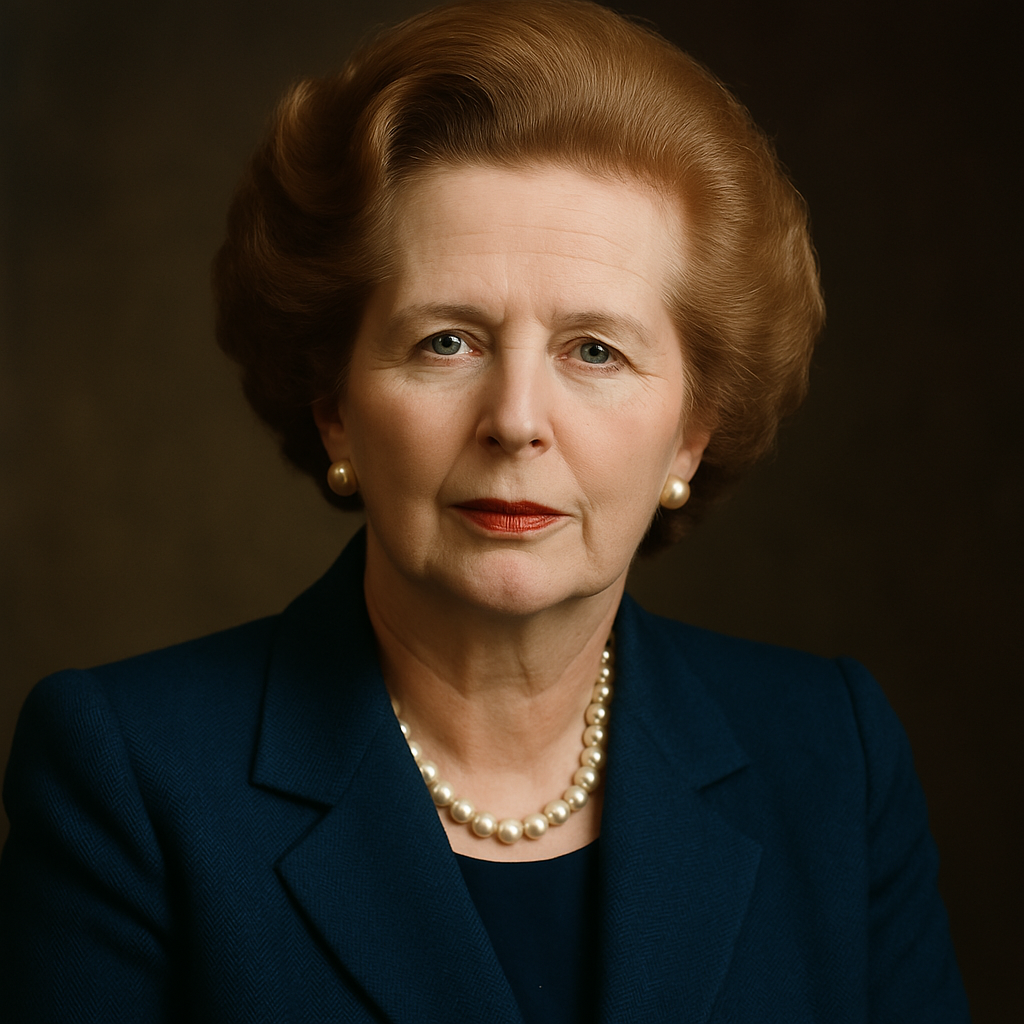1. Introduction
Margaret Thatcher, the United Kingdom’s first female Prime Minister, was a groundbreaking figure in 20th-century politics. Known as the “Iron Lady,” Thatcher served from 1979 to 1990, becoming the longest-serving UK Prime Minister of the 20th century. Beyond her significant policy achievements, ranging from economic reforms to her role in reshaping the geopolitical landscape, Thatcher’s leadership was deeply rooted in her strong personal charisma and polarising yet steadfast principles. Whether adored or criticised, she commanded attention and left a lasting legacy on Britain and the world.
Thatcher’s charisma was unlike the emotive, personable appeal exhibited by leaders such as Tony Blair or Barack Obama. Instead, her leadership style was emblematic of determination, authority, and intellectual confidence. She presented herself as a resolute and uncompromising figure, earning respect for her conviction and fearlessness. Yet her leadership was not without controversy, as her policies profoundly altered the fabric of British society. This whitepaper explores Thatcher’s unique form of charisma, the positive aspects of her leadership, criticisms of her approach, and lessons for modern professionals and leaders.
2. Thatcher’s Charismatic Traits
2.1 Decisiveness and Strength of Character
Thatcher’s assertive leadership style set her apart from her predecessors and contemporaries. She possessed a rare quality of decisiveness, often referred to as unshakeable resolve. From her transformation of the British economy through free-market policies to her unyielding stance during the Falklands War, Thatcher’s decisions reflected her ability to remain steadfast under pressure. Her famous declaration, “The lady’s not for turning,” became a signature statement of her character. People admired her for holding firm in her convictions, even when confronted with widespread opposition.
This trait also extended to her interpersonal interactions. Thatcher’s confidence often dominated conversations, making her a formidable presence in negotiations. Allies respected her strength, while opponents found her unwavering positions difficult to counter. For leaders, her ability to project certainty can serve as a lesson in the power of conviction, particularly when navigating complex issues.
2.2 Intellectual Rigor and Vision
Thatcher’s charisma was also rooted in her intellectual rigor and her methodical approach to problem-solving. She positioned herself as a leader who was not afraid to challenge conventional wisdom and bring new ideas to the forefront. By aligning herself with neoliberal economic principles, she confidently reshaped public discourse, challenging entrenched socialist ideologies that had dominated British politics for decades. Her vision of economic liberalisation—including the privatisation of state-owned industries, deregulation, and curbing the power of trade unions—formed the foundation of the “Thatcherite” doctrine.
Thatcher’s speeches often reflected her intellectual depth and clarity of thought. She was articulate in presenting complex economic and political ideas in ways that resonated with both experts and ordinary citizens. Her ability to simplify and communicate abstract principles reflected her skill as both a thought leader and an effective public communicator.
2.3 Symbol of Female Empowerment
As the first woman to lead the UK’s government, Thatcher achieved an unprecedented milestone in British and global politics. Her rise to power represented a major breakthrough in a political landscape historically dominated by men. While Thatcher did not explicitly position herself as a feminist, her personal story served as a powerful symbol of empowerment for women aspiring to enter leadership roles.
Thatcher’s charisma was closely tied to her self-crafted persona as someone who achieved success in spite of odds and skepticism. She portrayed herself as a leader who earned her place through sheer determination and merit, rather than gender-based efforts for equality.
3. Positive Aspects of Thatcher’s Charismatic Leadership
3.1 Transforming the British Economy
One of Thatcher’s most enduring legacies is her role in transforming the struggling British economy. When she assumed office in 1979, the UK was grappling with stagflation, high unemployment, and industrial unrest. Through bold reforms, including the reduction of state ownership, curbing union power, and fostering entrepreneurship, Thatcher reversed the economic decline and laid the groundwork for modernisation.
While these reforms were controversial, they ultimately revitalised Britain’s global competitiveness and shifted public consensus towards free-market policies. Thatcher’s ability to implement significant changes amidst resistance highlights the role charismatic leadership plays in driving necessary, albeit difficult, transformations.
3.2 Strength in Times of Crisis
Thatcher’s leadership was deeply tested during key crises, where her strength and determination became most evident. During the Falklands War of 1982, Thatcher refused to negotiate with Argentina over the invasion of the British-controlled Falkland Islands. Instead, she launched a military campaign to reclaim the territory, ultimately achieving victory. This decisive action not only boosted national morale but also reinforced her image as a leader of unwavering resolve.
Domestically, Thatcher also demonstrated strength in tackling challenges, including the infamous 1984–85 miners’ strike. While deeply divisive, her approach to confronting union power reshaped industry dynamics across the UK and reinforced her broader economic agenda.
3.3 Leading with Clarity of Purpose
Thatcher’s leadership success can largely be attributed to the clarity of her purpose and vision. She consistently communicated her policies and goals with conviction, ensuring that both her supporters and critics understood what she stood for. This focus allowed her government to implement significant structural changes efficiently, despite facing considerable political opposition.
Clarity is a crucial characteristic of effective leadership in both politics and business. Leaders who clearly articulate their values and priorities are better positioned to guide their teams or organisations through periods of uncertainty.
3.4 Forging a Global Legacy
Thatcher’s influence extended beyond Britain, shaping key global trends during the late 20th century. Her partnership with US President Ronald Reagan on issues such as free-market economics and Soviet containment defined the “special relationship” between the UK and the US during the 1980s. Thatcher also worked closely with Mikhail Gorbachev, helping to ease Cold War tensions and advocate for a more open dialogue between East and West.
Her global leadership amplified the belief that strong individual agency could influence historical outcomes. For professionals, this serves as a reminder of the importance of building strategic partnerships and expanding influence within wider networks.
4. Critique of Thatcher’s Leadership
4.1 Polarisation of British Society
While Thatcher remains admired for her transformative policies, her leadership deeply divided public opinion. Her economic reforms, particularly the closure of coal mines and other industrial facilities, disproportionately affected working-class communities in regions such as northern England, Scotland, and Wales. Many critics argue that these policies led to economic disparity between affluent areas in the South and struggling industrial regions.
Her uncompromising stance on labour unions, though effective in curbing excessive strikes, alienated large segments of the population. For many, Thatcher’s leadership symbolised a government detached from the working-class struggles, fostering resentment that persists in some communities to this day.
4.2 Over-reliance on Individualism
Thatcher’s emphasis on individual responsibility and self-reliance alienated those who viewed her policies as neglecting collective welfare. Her belief that “there is no such thing as society” triggered widespread debate and was criticised as emblematic of her lack of concern for social cohesion. Critics argue that her leadership, while effective in fostering economic growth, often placed economic prosperity above human welfare.
This critique serves as a cautionary tale for leaders in any sector: focusing too heavily on efficiency or measurable outcomes can lead to unintended social or ethical consequences.
4.3 Authoritarian Leadership Style
Thatcher’s assertive and uncompromising leadership style often led her to make decisions without seeking broad consensus. By centralising power within her government, she alienated colleagues who felt excluded from key decisions. This authoritarian approach contributed to her eventual downfall, as members of her own Conservative Party turned against her by 1990, leading to her resignation.
For modern leaders, this highlights the importance of balancing strong decision-making with inclusive dialogue. While decisive leadership is necessary, neglecting collaboration and shared accountability can erode long-term support.
5. Lessons for Modern Leaders
5.1 Embrace Bold Decision-Making
Thatcher’s legacy underscores the importance of decisiveness in leadership. Leaders in volatile or crisis-prone contexts must be willing to take bold, sometimes unpopular, actions for the greater good. However, these actions should be accompanied by detailed planning, transparent communication, and sensitivity to the needs of affected stakeholders.
5.2 Communicate Vision with Conviction
Clarity of vision and purpose was one of Thatcher’s defining traits as a leader. Modern professionals can learn to articulate their goals with confidence and consistency, ensuring that their teams understand and align with the broader strategy. Clear communication fosters trust, even in times of upheaval.
5.3 Balance Strength with Empathy
While Thatcher’s leadership style exuded strength, her lack of empathy alienated parts of the population. Leaders should aim to balance authority with genuine regard for the concerns and welfare of their stakeholders. This balance is critical in building enduring support and sustainable relationships.
5.4 Build Strategic Alliances
Thatcher’s ability to collaborate with world leaders, despite ideological differences, serves as a powerful lesson in diplomacy. For business professionals navigating a globalised economy, building cross-cultural alliances is vital for sustaining influence and advancing shared goals.
6. Conclusion
Margaret Thatcher’s rise to power and transformative leadership provides a case study in the power of charismatic leadership founded on conviction, intellect, and determination. From revitalising Britain’s economy to asserting global influence, Thatcher left an indelible mark on history. Yet, her polarising policies and authoritarian style also revealed the risks of over-reliance on unilateral decision-making and detached governance.
For modern business and political leaders, Thatcher’s legacy offers valuable lessons in effective communication, the importance of vision, and the need to balance strength with collaboration and empathy. By adopting these principles while avoiding the pitfalls of inflexibility, leaders can inspire positive change both within their organisations and on a broader societal scale.
7. References
- Thatcher, M. (1993). The Downing Street Years. HarperCollins.
- Campbell, J. (2000). Margaret Thatcher: The Grocer’s Daughter. Jonathan Cape.
- Evans, E. J. (2004). Thatcher and Thatcherism (2nd ed.). Routledge.
- Nye, J. S. (2008). The Powers to Lead. Oxford University Press.










